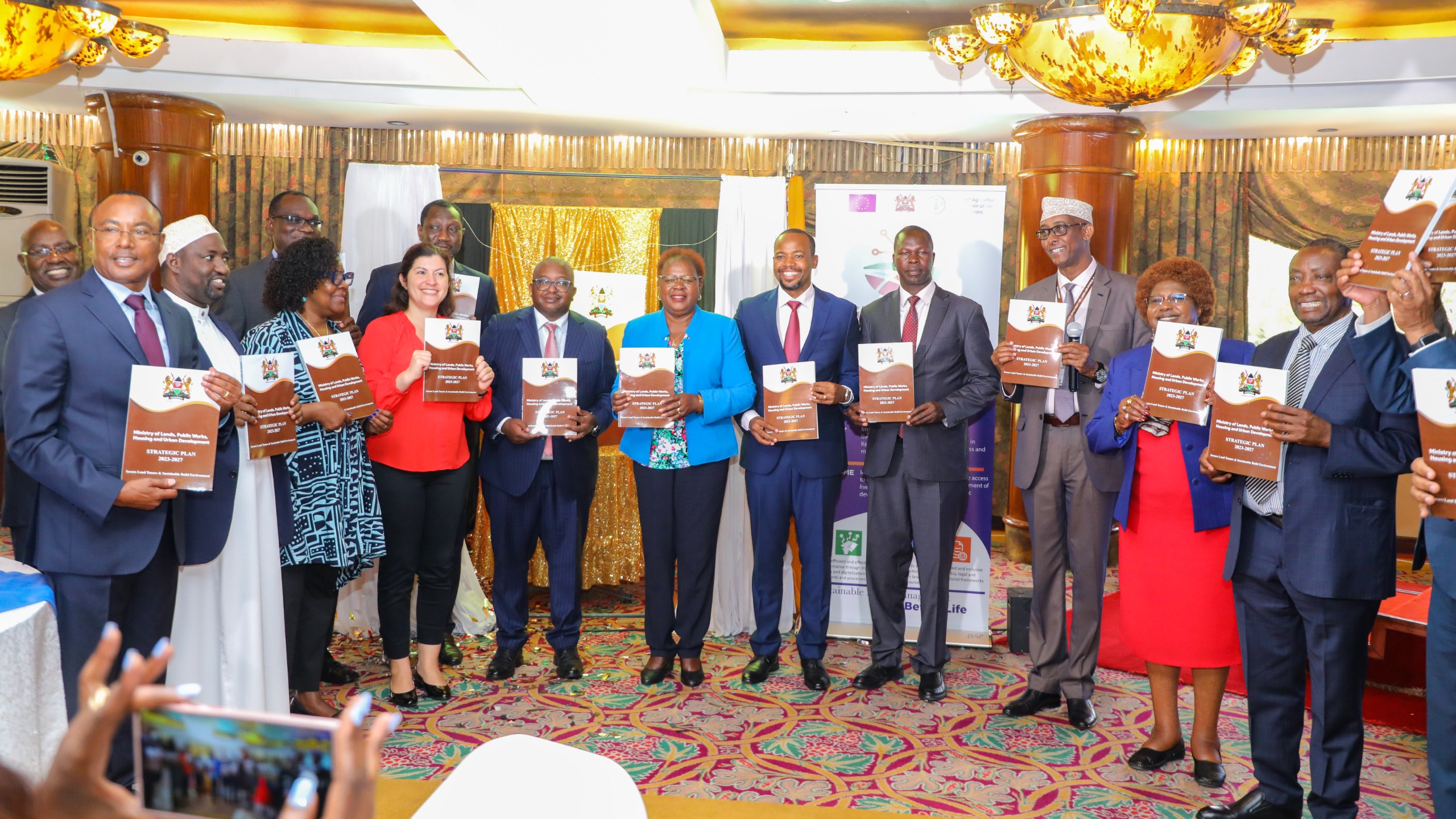Nairobi,
Tuesday March 19, 2024
KNA by Catherine Muindi
Lands Cabinet Secretary Alice Wahome presided over the launch of the Ministry’s Strategic Plan for the period 2023-2027 which will guide the Ministry’s implementation of activities, projects and programmes for the next five years.
Speaking on Monday during the launch at Safari Park hotel, Wahome said the Strategic Plan will promote job and wealth creation through affordable housing, security land tenure, enhanced revenue collection, and sector value chains promoting the country’s national Gross Domestic Product (GDP) for improved livelihoods.
The CS was accompanied by PSs Nixon Korir (Lands and Physical Planning), Joel Arumonyang (Public Works) and Charles Hinga Mwaura (Housing and Urban Development).
She said that the plan, which is aligned to the Kenya Vision 2030 and the Bottom-Up Economic Transformation Agenda (BETA) is not only a collection of objectives but a commitment to the Kenyans.
“The 2023-2027 Strategic Plan strives to provide a sense of predictability and instil confidence among its stakeholders, a structure for the Ministry’s decision-making process and a basis for budgetary decisions,” said CS Wahome.
She added that “The Ministry is committed to fast tracking registration of title deeds as well as transfer of titles in land transactions. It also commits to ensure that those who are landless are settled in line with BETA priorities thus encouraging private sector investment and enhancing revenue collection.”
In line with the government’s priority on delivery of affordable housing and human settlement, Wahome noted that the Ministry is currently implementing several strategic interventions to increase supply of new housing, realize growth in the number of mortgages and provide developers with incentives to build more affordable housing.
This Strategic Plan also seeks to complement sustainable planning, design and construction processes to achieve resilient public infrastructure. Strong legal frameworks in the environment will achieve compliance to industry standards and a well-regulated construction industry.
In the realm of Public Works, CS Wahome noted, the Ministry commits to robust infrastructure development, fostering connectivity and accessibility for citizens across the nation.She highlighted that, in the housing sector, the plan aspires to implement policies and initiatives that promote affordable and sustainable housing solutions.
Lands and Physical planning PS, Nixon Korir said his State Department is committed to carry out activities, projects and programmes that will benefit Kenyans.
“We are committed to digitize records in all land offices, do registration and issuance of more than 2 million title deeds, develop a national land cadastre, and standardize land value index,” said PS Korir.
PS Korir thanked development partners, particularly the European Union, Food and Agriculture Organisation of the United Nations for their continued support.
FAO Country Representative in Kenya Ambassador Carla Mucavi, congratulated the Ministry for the achievement of the Strategic plan 2023-2027.
“FAO is honoured to have supported the development of your Ministry’s Strategic Plan 2023 – 2027 being launched. In our partnership, we have seen notable achievements of the land governance programme, development and launch of the National Land Information Management System (NLIMS), Ardhisasa and improvement of the customer service center at the Ministry,” noted Mucavi.
The National Lands Commission chairman Mr. Gershom Otachi and European Union representative Myra Bernadi also spoke at the launch ceremony.
The launch of the strategic plan comes as the Ministry is progressing well in digitizing land records in different parts of the country, currently at Isiolo and Muranga land registries then head to Mombasa, Lamu and Machakos Counties.
Digitization eliminates historical land issues like documentation loss, title duplication, missing documents and reduces time and cost of land transactions. Digitization also eases business operations and revolutionises land ownership.
Courtesy; KNA


